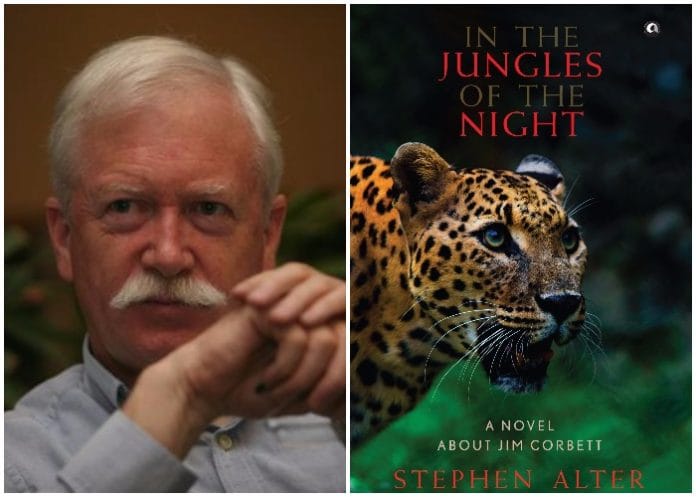The book is a compelling fictional account of Jim Corbett’s life doing justice to the legendary naturalist and conservationist of Nainital.
Who was Jim Corbett? The average reader typically knows of him as an India-born British hunter, naturalist, and an early conservationist who wrote bestsellers about his encounters with man-eating tigers. Little is known though about the man behind the public figure. Stephen Alter’s In The Jungles Of The Night is a fictionalised account of Jim Corbett’s life and times.
In his boyhood, young Jim, already enthralled by the mysteries of the jungle helps to absolve a tiger wrongly believed to have killed a Nainital resident. It’s a sequence that reflects on his inquiring mind and ability to understand the ways of nature, a pointer to the years ahead.
In his middle age, Corbett virtually abandoned his gun for the camera. More aspects of his personality tumble out in the second part of the novel. Maturity has enriched him; his skill and deep knowledge go hand in hand with kindness and sensitivity. It also introduces a tigress and Kaiyu, a girl from the Mayaghat jungles. Jim finds in Kaiyu a kindred spirit who understands the jungle and shares a deep, almost mystical bond with the tigress.
A bunch of fictionalised historical characters offer a larger portrait of those times – dirt poor Bihari labourers brought in by the East India Company to fell trees for the railways, a Gandhian activist urging revolt against the Raj and the peaceful but elusive tribal ‘Banrajis’ who must retreat into the jungle as their dwellings are encroached upon.
Where do Jim’s loyalties lie? He is a loyal British subject but is pained by the cruel face of colonialism. The felling of trees pains him but he sees the railways, a necessity, as the “lifeline of the country upon which the colonial empire flourished.”
The concluding section of the book titled, ‘Until Day Break’, is set in Kenya, where the real-life Corbett moved to with his sister Maggie after a lifetime in India. He’s an author now, recounting his British army days, leading 500 Indian soldiers into war and returning with all except one. A precious possession from India is a mist-laden photograph of Kaiyu that awakens in him an “incurable ache…for the wild beauty of those Indian Jungles.’
Why did Jim leave his beloved Nainital as India prepared for independence? Alter’s entirely plausible guess:“My sixth sense told me it was time to go… that primal instinct for survival passed down through our ancestral genes when a hunter finally knows the game is up.”
This book is shortlisted for the DSC Prize for South Asian Literature, 2017 whose winner is to be announced 18 November, 2017.
Read reviews of other books shortlisted for the prize:






